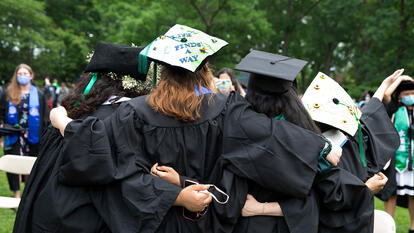Mellon Innovation Grant Sparks New Ways to Teach and Learn at Wellesley

Students studying human evolution with Associate Professor of Anthropology Adam Van Arsdale this year will have a new, state-of-the-art learning experience. Wearing virtual reality headsets, they will be able to see and “handle” 3-D scans of human bones and fossils, using hand-held tools to grasp the virtual specimens.
With help from a grant to Wellesley for Evidence-Based Teaching Innovations from the Andrew W. Mellon Foundation, Van Arsdale (pictured above, center) and Kamile Lukosiute ’19 (pictured above, left), a physics major and a student in the Knapp intern program, developed a virtual reality system in which users wearing special headsets and goggles feel as if they are immersed in a lab stocked with specimens used in his Human Evolution and Forensic Anthropology course.
“It’s as if they are in an entirely different space and they have access to the materials that are the core of our studies,” he said. “It’s immensely helpful to teaching and learning.”
Van Arsdale is one of several faculty members who have received funding through the Mellon grant, which gives the College $800,000 over four years to bring innovative teaching methods into the classroom, said Akila Weerapana, associate professor of economics, who helped Wellesley secure the grant.
Ann Trenk, professor of mathematics, used Mellon grant funding to develop an approach to teaching that she said is geared to increasing student performance and persistence in STEM fields.
Trenk said many students enroll in upper-level mathematics courses expecting to use study strategies that worked in high school, only to find that those strategies are inadequate. “In particular, students who work alone or do not regularly attend office hours or communicate with classmates may lose confidence in their ability as math students and stop taking math classes,” she said.
Her new strategy is to build communities or study groups in which students will work together during the school year—collaboration, she said, is vital in higher-level math. She will also encourage them to work on homework problems during her office hours and on their own.
PERA Professor of the Practice Connie Lynn Bauman is also benefiting from the grant, developing a course called Live and Learn: Understanding Mind-Body Connections. She and Jeannine Johnson, senior lecturer and director of the Writing Program, teach students about the connection between physical and mental well-being and academic work.
“We want to help students explore and practice effective, good self-care habits and ways to handle stress and anxiety,” Bauman said, noting that there is a close relationship between wellness practices and cognitive abilities and memory.
Their approach, she said, will involve discussions of a “toolkit” of coping strategies that will include mindfulness meditation, yoga, and tai chi in hopes that students will make these practices a regular part of their lifestyles. Through lectures, readings, and writing assignments, they will also learn about the value of proper sleep and exercise.
Students will track their progress and success by recording personal health data in a journal twice a week.
Eni Mustafaraj, assistant professor of computer science, used the grant to continue developing a teaching intervention that will help students taking Computer Programming and Problem Solving better understand computational concepts.
Mustafaraj said growing interest in computer science has attracted more students of varying skills and aptitudes. In the spring semester of 2016, the team of CS faculty who teach the course introduced a change.
In addition to giving three exams spread over 13 weeks as they had in the past, they added weekly quizzes accompanied by reflections, in which students could compare their solutions to problems with those provided by the faculty and thereby consider different approaches to problem solving. These quizzes and reflections gave students and faculty opportunities to assess learning on a more frequent and targeted basis.
Mustafaraj, like the other faculty who received funding from the Mellon grant, worked closely with Sara Fulmer, a teaching and learning assessment specialist hired with the grant. She has helped faculty formulate assessment methods and understand scientific literature on learning and teaching innovations.
Mustafaraj said her collaboration with Fulmer during the fall 2016 and spring 2017 semesters allowed her to analyze data and make continuous improvements to this intervention, which are still ongoing.



